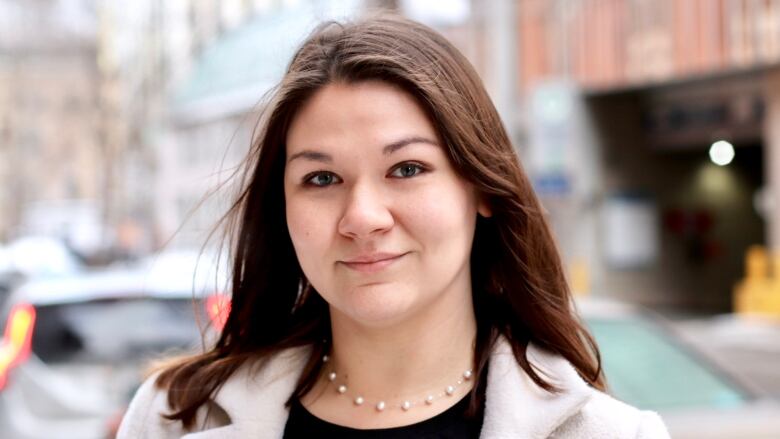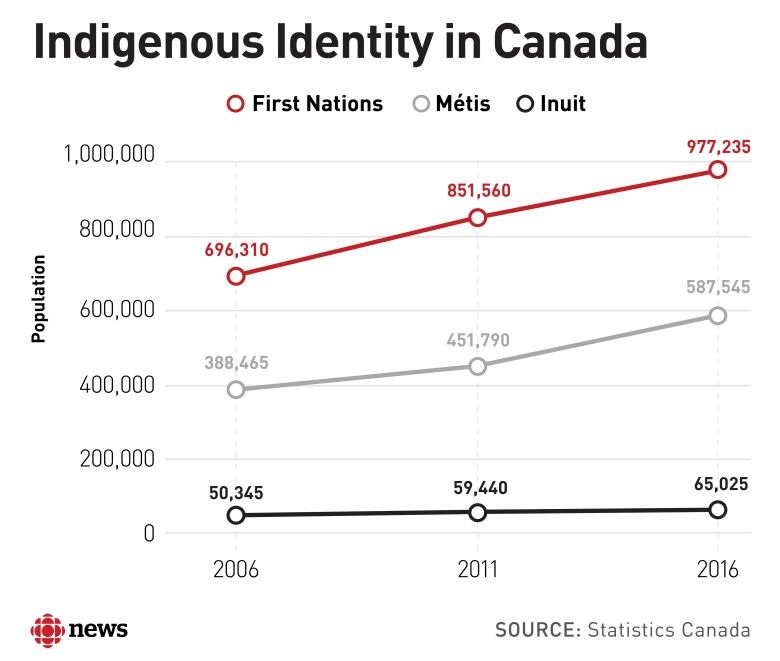Ex-Senate staffer says she felt forced out for questioning colleague's Mtis identity claims
I was made to seem like I was mentally unwell,' former employee says

A former staffer for a Manitoba senator says she felt forced to resign over the fallout from a complaint she made alleging a co-worker was falsely claiming an Indigenous identity.
Breanne Lavallee-Heckert, a citizen of the Manitoba Mtis Federation, brought her concerns to Sen. Marilou McPhedran in April in a letter explaining why her co-worker's claims of beingMtis were problematic and the impact it was having on her at work.
"Being exposed to someone actively stealing my identity and culture is one of the most humiliating and belittling things I have put myself through," she wrote to the senator.
Lavallee-Heckert said she wasn't asking for her co-worker to be fired, but she did want the personto stop identifying as Mtis, and she asked for "significant changes" to be made.
Instead, she said, "I was made to seem like I was mentally unwell and I was the one who was having problems."
In addition to how Lavallee-Heckert was affected at work, her experience speaks to how employers need to be able to investigateallegations of this nature in a changing work environment where there's an increasing push to diversify the workplace, says a veteran Toronto employment lawyer.
Lavallee-Heckert started working part-time for McPhedran while attending McGill University'slaw school in Montreal two years ago. She worked out of Montreal, while the rest of her co-workers werebased in Ottawa.
She said her co-worker's claims ofbeing Mtis always bothered her, but they were amplifiedwhen their work moved online due to theCOVID-19 pandemic. This meant she was exposed tomore frequent comments about her colleague's "indigeneity."
"This happened regularly before, but now I am dealing with this multiple times, every day, on every Zoom call," Lavallee-Heckert said in her letter to McPhedran.
She said red flags went upimmediately when she realized that not only was the co-worker self-identifying as Mtisbutthat she was a member of a controversial organization in Quebec.
"As a Mtis person, I know that there's no Mtis people from Quebec," she said.
Co-worker belonged to controversial group
Her co-worker was a member of the Communaut mtisse du Domaine du Roy et de la Seigneurie de Mingan, a group that has been identified as part of a phenomenon described as "race-shifting." It's a term that's been used by academics like Darryl Leroux, author of Distorted Descent: White Claims to Indigenous Identity, to describe people who previously identified as white and then start self-identifying as Indigenous.
The Communaut has been among the most active "Eastern Mtis" groups in Eastern Canada in its attempts to get formal recognition in Quebec through the courts. But the group has failed in the courts to demonstrate the existence of a historic Mtis community in the territory where it bases its claims.

"They are not Mtis. In Canadian jurisprudence, there's no recognition of them as Mtis; no Indigenous group recognizes them as Mtis; they're clearly not Mtis," said Lavallee-Heckert, who graduated from law school in the spring.
CBCNews reached out to the staff memberat the root of the allegations raised by Lavallee-Heckert but did not receive a reply at the time of publishing.
She also found it difficult when her co-worker was celebrated for working on amendments to the Indian Act.
"There's just something grossly colonial about the thought of somebody falsely claiming a Mtis identity working on amendments to the Indian Act," she said.
Staffer saw the senator as an ally
Lavallee-Heckert said she felt she had a responsibility to say something, so she worked up the courage and documentation she felt necessary to approach the senator.
"I couldn't just say, 'Because I'm Mtis, I know she's not Mtis,' because I didn't think the senator would respond to something like that. But I thought she would respond to actually sourced, scholarly work," she said.
The senator, who has been a member of the Senate committee on Aboriginal peoples, "knows who the Mtis are," Lavallee-Heckert said, and she saw her as an ally ofIndigenous peoples, especially Indigenous women.
McPhedran is a human rights lawyer, former professor at the University of Winnipeg and a member of the Order of Canada. She was appointed to the Senate in 2016 by Prime Minister Justin Trudeau.
During her time inthe Red Chamber, she has supported legislation implementing the United NationsDeclaration on the Rights of Indigenous Peoples, tabled an amendment to eliminate sex-based discrimination in the Indian Act and been a vocal critic of Sen. Lynn Beyak.
Beyak was suspended from the Senate in February for failing to complete anti-racism training connected to racist letters posted to her website that defended her positive views on residential schools.
Lavallee-Heckert said she respected the work McPhedranwas doing and thought she "would recognize the facts of the case" that she presented.
She included six footnotes in her letter to the senator.
Only option was to resign
Lavallee-Heckert said she didn't predict the response she received when she brought her concerns forward.
"Human resources didn't care there was somebody falsely claiming a Mtis identity in the Senate [and] neither did the senator," she said.
Part of the problem, she said, was that the HR departmentseemed ill-equipped to navigate the substance of her complaint, recalling at one point she was asked to give an "elevator pitch" explaining what the Mtis Nation is.
"Those sorts of moments were absolutely crushing.... Where I had to talk about the experience of working with somebody who is stealing your identity, basically, to somebody who didn't even know anything about the Mtis Nation," Lavallee-Heckert said.
As the months went on, she said shefelt her only optionwas to resign, which she did in a letter dated June 30.
"I wasn't interested in working for somebody who did not believe that Mtis people have the inherent right to determine who belongs to our Nation."
The senator's response
McPhedran declined an interview with CBCNews, citing confidentiality concerns. However, she said in an emailed statement that she requested an "external independent review of the workplace environment" in her office in April 2020.
She didn't offer specifics of what that review involved but said it is now complete. She described it as "a beneficial exercise that allowed all members of my office to share their concerns in a constructive, positive and inclusive manner. The insights gathered from this experience will help further enhance respect and collaboration in my office."

In email correspondence shared with CBC, McPhedran began her response to Lavallee-Heckert's letter of resignation by saying, "It is with regret and disappointment in you that I accept your resignation."
The senator also wrote that she disagreed with Lavallee-Heckert's accounting of events.
"The factual errors in your most recent letter are too numerous to list or respond to in detail, given your closed and hostile demeanour that emerged for the first time in April 21, 2020 in your letter to me and our subsequent phone discussions that day only to be emphasized in your letter of resignation."
McPhedran ended the letter by wishing Lavallee-Heckert well and wrote that the "actual facts" of what transpired are "well documented and available to you or anyone who wishes accurate information."
Lavallee-Heckert, who is currentlyliving in Winnipeg and plans to pursue graduate studies in law at McGill in September,said she was surprised by the senator's tone.
"It was just mean, to be honest," she said.
"It's like she's not reading what I'm saying and not actually listening or understanding, or coming from a place of willingness to learn or willingness to be wrong."
Indigeneity and employment law
Howard Levitt, a Toronto employment lawyer, said he couldn't comment on the specifics of theevents without having all the facts. But he saidthe stakes are "really quite serious, especially in a body like the Senate."
Applicants for jobs withthe Senate can self-identify as Indigenous when applying, and there is no further verification process beyond self-identification.
"We are in a time where it is a tremendous advantage to be Aboriginal or Black," he said, referring torecent shifts in hiring practices.

With employers increasingly looking to hire Indigenous people, Levitt said, "that will invariably incent certain people to falsely claim that status. What is the employment law repercussion for doing that? In my view it's cause for discharge."
Falsely claiming to be an Indigenous person in a job application, he said, is akin to lying on a resum, which can be grounds for termination without severance.
"It's a fundamental fraud in the workplace," Levittsaid.
If somebody raises questions about a person's claims of indigeneity, he said, they should be taken seriously and protected from repercussions, so whistleblower protection is important.
It's unclear how the events in the senator's office were communicated to the person at the root of the complaint. They recently removed the word "Indigenous" from a social media profile and left their job at the Senate.
The circumstances of their departure areunknown.
CBC is not aware if the staff member self-identified as Indigenous in their application to work at the Senate.












_(720p).jpg)


 OFFICIAL HD MUSIC VIDEO.jpg)
.jpg)



























































































